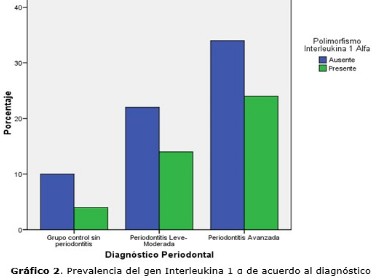Genetic polymorphism as a risk factor in chronic periodontitis
Abstract
Background: genetic polymorphisms such as interleukin 1 gene coding for the hyper secretion of certain cytokines to different stimuli, favors the establishment of periodontitis.
Objective: to determine the prevalence of interleukin 1 genes and their association with chronic periodontitis in a Colombian population.
Methods: in this cross-sectional research, the universe was composed of 108 patients. The diagnosis of mild- moderate to advanced chronic periodontitis was based on pre-defined criteria. Patients with no evidence of these periodontal diagnoses were used as a control group. For determination of the polymorphism of interleukin genes 1 α and β, cheek epithelial cells of the oral mucosa were taken using a swab and a mouthwash.
Results: the prevalence of interleukin-1 α and β genes was higher in the group of patients with advanced periodontitis, but no statistically significant differences were observed when compared to the other groups. No statistically significant associations between genes Interleukin 1 α and β with some form of periodontitis were observed.
Conclusions: no statistically significant association between interleukin 1 α and β genes and chronic periodontitis was observed, therefore this polymorphism cannot be considered a risk factor for that kind of periodontitis in this population.
DeCS: POLYMORPHISM, GENETIC; CHRONIC PERIODONTITIS; RISK FACTORS; STATISTICAL ANALYSIS; CROSS-SECTIONAL STUDIES.
Downloads

Published
How to Cite
Issue
Section
License
Copyright (c) 2016 Carlos Martín Ardila Medina, Margarita Rosa Bermúdez Quintero, Isabel Cristina Guzmán Zuluaga

This work is licensed under a Creative Commons Attribution-NonCommercial 4.0 International License.
Copyright: Camagüey Medical Archive Magazine, offers immediately after being indexed in the SciELO Project; Open access to the full text of the articles under the principle of making available and free the research to promote the exchange of global knowledge and contribute to a greater extension, publication, evaluation and extensive use of the articles that can be used without purpose As long as reference is made to the primary source.
Conflicts of interest: authors must declare in a mandatory manner the presence or not of conflicts of interest in relation to the investigation presented.
(Download Statement of potential conflicts of interest)
The Revista Archivo Médico de Camagüey is under a License Creative Commons Attribution-Noncommercial-No Derivative Works 4.0 International (CC BY 4.0).
This license allows others to distribute, to mix, to adjust and to build from its work, even for commercial purposes, as long as it is recognized the authorship of the original creation. This is the most helpful license offered. Recommended for maximum dissemination and use of licensed materials. The full license can be found at: https://creativecommons.org/licenses/












 22 julio 2025
22 julio 2025